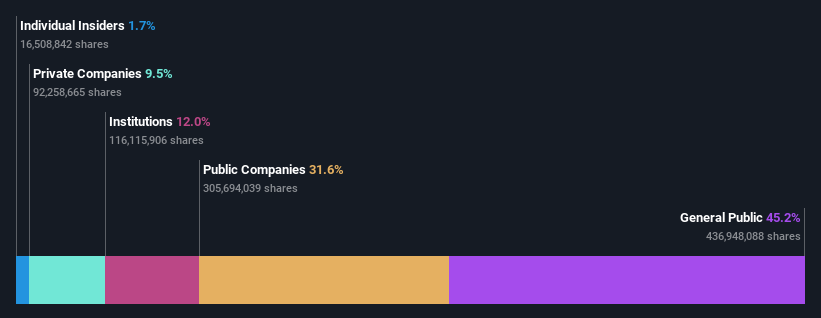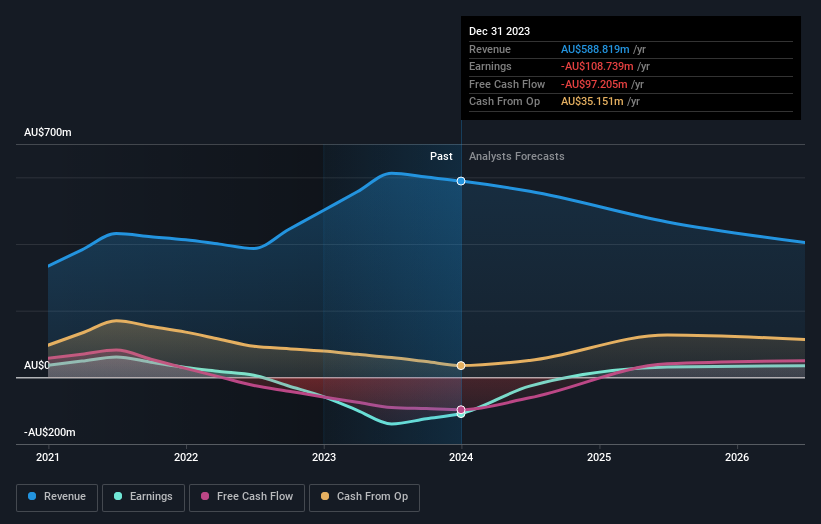Aeris Resources Limited's (ASX:AIS) largest shareholders are retail investors who were rewarded as market cap surged AU$58m last week
Key Insights
Significant control over Aeris Resources by retail investors implies that the general public has more power to influence management and governance-related decisions
A total of 5 investors have a majority stake in the company with 51% ownership
A look at the shareholders of Aeris Resources Limited (ASX:AIS) can tell us which group is most powerful. We can see that retail investors own the lion's share in the company with 45% ownership. That is, the group stands to benefit the most if the stock rises (or lose the most if there is a downturn).
Clearly, retail investors benefitted the most after the company's market cap rose by AU$58m last week.
Let's take a closer look to see what the different types of shareholders can tell us about Aeris Resources.
See our latest analysis for Aeris Resources
What Does The Institutional Ownership Tell Us About Aeris Resources?
Many institutions measure their performance against an index that approximates the local market. So they usually pay more attention to companies that are included in major indices.
Aeris Resources already has institutions on the share registry. Indeed, they own a respectable stake in the company. This suggests some credibility amongst professional investors. But we can't rely on that fact alone since institutions make bad investments sometimes, just like everyone does. If multiple institutions change their view on a stock at the same time, you could see the share price drop fast. It's therefore worth looking at Aeris Resources' earnings history below. Of course, the future is what really matters.
Hedge funds don't have many shares in Aeris Resources. Washington H. Soul Pattinson and Company Limited is currently the largest shareholder, with 31% of shares outstanding. For context, the second largest shareholder holds about 8.5% of the shares outstanding, followed by an ownership of 4.8% by the third-largest shareholder. Furthermore, CEO Willie Labuschagne is the owner of 0.6% of the company's shares.
Our research also brought to light the fact that roughly 51% of the company is controlled by the top 5 shareholders suggesting that these owners wield significant influence on the business.
While it makes sense to study institutional ownership data for a company, it also makes sense to study analyst sentiments to know which way the wind is blowing. Quite a few analysts cover the stock, so you could look into forecast growth quite easily.
Insider Ownership Of Aeris Resources
The definition of company insiders can be subjective and does vary between jurisdictions. Our data reflects individual insiders, capturing board members at the very least. Management ultimately answers to the board. However, it is not uncommon for managers to be executive board members, especially if they are a founder or the CEO.
Most consider insider ownership a positive because it can indicate the board is well aligned with other shareholders. However, on some occasions too much power is concentrated within this group.
We can see that insiders own shares in Aeris Resources Limited. It has a market capitalization of just AU$164m, and insiders have AU$2.8m worth of shares, in their own names. This shows at least some alignment, but we usually like to see larger insider holdings. You can click here to see if those insiders have been buying or selling.
General Public Ownership
The general public-- including retail investors -- own 45% stake in the company, and hence can't easily be ignored. This size of ownership, while considerable, may not be enough to change company policy if the decision is not in sync with other large shareholders.
Private Company Ownership
We can see that Private Companies own 9.5%, of the shares on issue. It's hard to draw any conclusions from this fact alone, so its worth looking into who owns those private companies. Sometimes insiders or other related parties have an interest in shares in a public company through a separate private company.
Public Company Ownership
We can see that public companies hold 32% of the Aeris Resources shares on issue. It's hard to say for sure but this suggests they have entwined business interests. This might be a strategic stake, so it's worth watching this space for changes in ownership.
Next Steps:
While it is well worth considering the different groups that own a company, there are other factors that are even more important. Case in point: We've spotted 2 warning signs for Aeris Resources you should be aware of, and 1 of them doesn't sit too well with us.
Ultimately the future is most important. You can access this free report on analyst forecasts for the company.
NB: Figures in this article are calculated using data from the last twelve months, which refer to the 12-month period ending on the last date of the month the financial statement is dated. This may not be consistent with full year annual report figures.
Have feedback on this article? Concerned about the content? Get in touch with us directly. Alternatively, email editorial-team (at) simplywallst.com.
This article by Simply Wall St is general in nature. We provide commentary based on historical data and analyst forecasts only using an unbiased methodology and our articles are not intended to be financial advice. It does not constitute a recommendation to buy or sell any stock, and does not take account of your objectives, or your financial situation. We aim to bring you long-term focused analysis driven by fundamental data. Note that our analysis may not factor in the latest price-sensitive company announcements or qualitative material. Simply Wall St has no position in any stocks mentioned.


